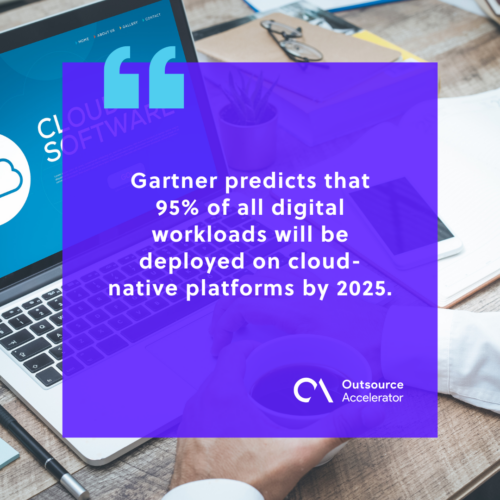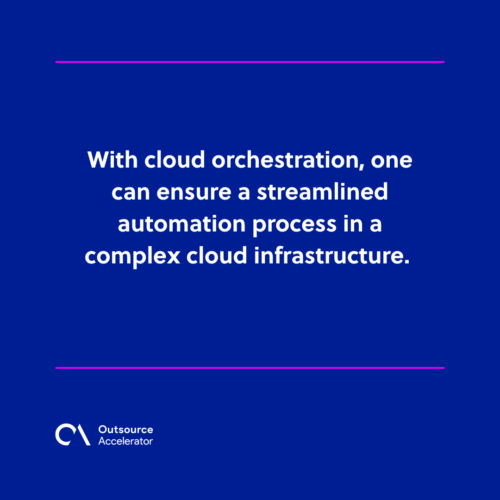Top 12 cloud orchestration tools of 2025

List of top cloud orchestration tools
- ActiveBatch
- RunMyJobs
- Pupper Bolt
- BMC Multi-Cloud Management
- Kubernetes
- Morpheus
- CloudHealth
- Cloudify
- Red Hat Ansible
- CloudBolt
- Terraform
- Spacelift
There has been rapid growth towards the adoption of cloud software in businesses around the world. More and more organizations have been relying upon their data and cloud computing.
Automation in the cloud gives a lot of benefits, such as cost-effectiveness and improving the performance workflow system.
As cloud computing[1] deals with huge amounts of data, this is hard work for IT teams as they are required to arrange cloud resources successfully. As a result, IT firms have turned to new technology.
Thus, cloud orchestration[2] comes into the picture. These tools automate an enterprise’s workload, saving costs and time while enhancing efficiency.
This article will discuss the fundamentals of cloud orchestration tools, their distinction with cloud automation, and some of the best cloud orchestration tools that organizations can use.
What is cloud orchestration?
Cloud orchestration is the use of programming technology in automating tasks, resources, and infrastructure in public and private cloud infrastructures.
Cloud orchestration technologies allow IT teams to better manage their cloud infrastructure through streamlining processes and resource allocation across the cloud environment.
The demand for cloud orchestration in businesses has grown exponentially. In fact, Gartner predicts that 95% of all digital workloads will be deployed on cloud-native platforms by 2025.
Cloud orchestration software ensures coordination and connects complex computing systems into cohesive systems relevant to perform specific business functions.
Key features for a cloud orchestration tool
Here are ten key features to look for in the top cloud orchestration tools:
- Resource provisioning – The ability to provision and manage cloud resources, such as virtual machines, storage, and networking components, based on predefined templates or configurations.
- Automation – Automating deployment, scaling, monitoring, and maintenance tasks to streamline operations and reduce manual effort.
- Orchestration – Coordinating and managing complex workflows and processes across multiple cloud resources and services.
- Scalability – Supporting dynamic scaling of resources based on workload demands to ensure optimal performance and resource utilization.
- Monitoring and logging – Providing visibility into the performance and health of cloud resources through monitoring, logging, and alerting capabilities.
- Security and compliance – Implementing security best practices, access controls, encryption, and compliance policies to protect data and ensure regulatory compliance.
- Integration – Offering integration with other tools, services, and platforms to facilitate seamless communication and interoperability within the cloud environment.
- Workflow automation – Enabling the creation and execution of automated workflows to manage diverse tasks, dependencies, and actions within the cloud infrastructure.
- Version control – Supporting versioning and tracking changes to infrastructure configurations and code to facilitate collaboration and ensure consistency.
- Multi-cloud support – Allowing organizations to manage resources and workloads across multiple cloud providers or hybrid cloud environments to maximize flexibility and avoid vendor lock-in.

Cloud orchestration vs cloud automation
Most often, cloud orchestration and cloud automation are used interchangeably. Cloud automation deals with a single task.
Thus, cloud automation focuses on the automation of the single element in the cloud system, to be repeated with minimal operator intervention.
On the other hand, cloud orchestration is the superset of the automation process. It is an end-to-end process that enables the IT team to take a set of automated processes. These processes are brought together into a specified workflow that fully automates service delivery.
12 best cloud orchestration tools in 2025
Here are the best cloud orchestration tools in the market that organizations can check out:
1. ActiveBatch
ActiveBatch is a versatile cloud orchestration tool that allows businesses to reliably automate processes across multiple cloud providers, existing application, and on-premise systems.
With an intuitive, drag-and-drop interface, ActiveBatch simplifies implementation and configuration.
It seamlessly integrates with various business systems and data through a comprehensive connector library and a Super REST API adapter, enabling developers to easily build API integrations without custom scripting.
ActiveBatch provides event-driven automation to minimize manual intervention, offering automated remediation and alerts for internal operations teams to prevent job delays or failures. It also includes advanced date/time scheduling with custom business rules and fiscal calendars.
2. RunMyJobs
RunMyJobs by Redwood is a cloud-based platform that offers full-stack automation capabilities for mission-critical processes.
Its user-friendly visual editor, 25 scripting languages, and unlimited systems connectivity on-premises or in the cloud enable businesses to compose and automate end-to-end workflows quickly.
In addition, RunMyJobs is built for SaaS scalability and multi-cloud environments, eliminating the hassle of hosting and maintaining your automation platform.
It can easily integrate with popular cloud providers such as AWS, Azure, Google Cloud Platform, and VMware to automate cross-platform process workflows that can be managed and monitored from a single location.
With over 30 years of successful migration experience, RunMyJobs ensures a smooth migration process with proprietary transfer tools, a proven migration approach, and 24/7 availability.
3. Puppet Bolt
Puppet Bolt is also one of the most sought configuration automation tools that help software teams specify configuration for various cloud resources. The tool maintains partnerships and integrations with Microsoft, Google, Amazon, and VMware.
With Puppet Bolt, it offers an advantage in managing all aspects of cloud-based infrastructure, from computing to storing to networking resources.
Puppet Bolt handles multi-platform server configuration while ensuring security and compliance policies enforced across cloud services.
4. BMC Multi-Cloud Management
BMC Multi-Cloud Management produces software and services that support businesses moving into digital operations. It seamlessly manages multiple clouds and their data in various ways.
This tool allows users to simplify data for multi-cloud storage, thus, creating and performing a hassle-free data migration process.
There’s also a feature of predictive services management and monitoring of clouds across hybrid environments to determine any issues quickly and easily.
5. Kubernetes
If a company is focused on deploying, scaling, and managing containerized applications, Kubernetes is a great cloud orchestration tool to use.
It is known as the de facto standard for enterprise container orchestration. However, Kubernetes is not an actual infrastructure configuration management tool.
It supports deploying and operating cloud-based apps based on a containerized microservice architecture for any cloud.
Kubernetes is a good solution for large companies to manage complexity, making its traditional configuration management tools completely obsolete.
6. Morpheus
Morpheus is a unified multi-cloud orchestration and automation tool that aims to help developers with their self-service infrastructure.
One of its main features is the analytics module, which provides insights into resource utilization, and cloud spending. These can help users to compare he costs of using cloud infrastructure and resources.
Morpheus offers a wide range of functions, such as;
- Building service catalogs
- Establishing complex multi-cloud structures
- Access stack visualization tools
- Governing and controlling access to cloud resources using multi-tenant policies
- Connecting service catalogs to ServiceNow
- Creating policies for workflows
- Keeping track of configuration management activities
7. CloudHealth
CloudHealth is VMware’s latest software platform. It is a GUI-based cloud orchestration and management tool focused on managing hybrid cloud services for businesses.
This tool offers a wide range of features and functionalities, including multi-platform visibility that provides reports and data analytics through a dashboard.
The dashboard significantly helps most small and medium-sized businesses to identify and monitor overall costs and discover trends relevant for budgeting based on growth models.
CloudHealth has built security, compliance, and governance to ensure there are no instances of data breaches and offers a holistic cloud orchestration function for businesses.
8. Cloudify
Cloudify is an open-source and multi-cloud orchestration platform that connects, automates, and manages applications and services.
This tool automates the configuration process in the cloud and supports different public clouds and those under active development.
Cloudify is a great choice for companies that need to configure, deploy, and remediate applications and network processes in multi-cloud and stack infrastructure.
9. Red Hat Ansible
Launched in 2012, Red Hat Ansible is among the cloud orchestration tools that offer businesses easy-to-use task-based infrastructure automation.
Ansible YAML DSL allows users to simplify tasks and manage all aspects of cloud infrastructure without installing a single agent.
Furthermore, Ansible can connect multiple vendors and services together. It has a one-venue approach to managing through wrapper modules with lightweight and swift deployability.
Integrations for Red Hat Ansible include Microsoft Azure Cloud Computing, Amazon Web services, Google Cloud Computing, VMware Rackspace, and Digital Ocean.
10. CloudBolt
CloudBolt is a cloud orchestration tool focusing on hybrid cloud management. It offers enterprise hybrid cloud platforms that aim to be self-serving and easily scalable.
This tool is geared toward orchestrating diverse infrastructure, including legacy services that need to be integrated with pre-existing and possible future platforms.
Cloudbolt’s main features include:
- Reporting and management from one location
- Easy to use
- Customer-centric
- Easy scalability that adapts with future integrations
- Transparency in cost and health of service
11. Terraform
Terraform is an open-source platform for infrastructure automation. This tool helps in configuring, provisioning, and managing cloud infrastructure as code.
Terraform tool helps automatically configure resources by building a graph database that provides insight into resource dependencies.
Terraform allows users to have their infrastructure across various cloud infrastructures through a single and consistent CL workflow.
12. Spacelift
Spacelift is your trusted IaC (Infrastructure as Code) Orchestration Platform, engineered to provide a secure and resilient infrastructure solution that DevOps teams can rely on.
Through Spacelift’s innovative approach, organizations can achieve sustainable scalability in managing their infrastructure. The platform effectively addresses various challenges in the fields of CI/CD automation, drift detection, Terraform scalability, and OpenTofu migration.
Key features and solutions offered by Spacelift:
- Scale infrastructure safely and efficiently with an end-to-end workflow
- Standardize and control infrastructure provisioning and configuration
- Implement secure collaborative workflows for enhanced developer velocity
- Achieve CI/CD automation for infrastructure initiatives
- Efficiently address Terraform scalability and OpenTofu migration
- Enhance infrastructure governance with pre-defined policies and automated drift detection
- Facilitate seamless communication and collaboration across teams
5 benefits of cloud orchestration tools
Businesses increasingly rely on cloud platforms to optimize operations, enhance scalability, and improve efficiency. However, managing multiple cloud services across diverse environments can be complex.
This is where cloud orchestration plays a vital role, streamlining cloud processes and automating resource management.
Here’s why you should use cloud orchestration solutions:
1. Efficient cloud infrastructure management
Organizations using cloud infrastructure management tools can automate workflows, optimize resource allocation, and reduce manual intervention. This leads to improved performance and cost savings.
2. Seamless integration across multiple cloud services
With businesses leveraging multiple cloud services, maintaining consistency across different platforms can be challenging. Cloud orchestration solutions enable seamless integration, ensuring interoperability among various systems.
3. Enhanced security and compliance
By automating security protocols and access controls, cloud orchestration strengthens data protection within the cloud environment. It also helps businesses meet industry-specific compliance standards more efficiently.
4. Improved resource optimization
Cloud orchestration solutions monitor workloads and adjust resource allocation dynamically. This ensures businesses get the best performance from their cloud platforms while minimizing costs.
5. Scalability and flexibility
Organizations working with public cloud providers can scale resources up or down based on demand. Cloud orchestration automates this process, providing agility without manual intervention.
Automate your processes through cloud orchestration
Cloud orchestration tools have their strengths, weaknesses, and learning curves. It is important to choose the right tool that will suffice the needs of business projects and the team.
With cloud orchestration, one can ensure a streamlined automation process in a complex cloud infrastructure.
That said, automating with cloud orchestration leads to increased efficiency and security. Aside from cost reduction, cloud orchestration tools also have features supporting DevOps reductions, all geared toward achieving business success.

Article References
[1] Cloud computing. Saini, H., Upadhyaya, A., and Khandelwal, M.K. (2019). Benefits of Cloud Computing for Business Enterprises: A Review. [online] papers.ssrn.com.
[2] Cloud orchestration. Kikuchi, S., Thomas, I., Jallouli, O., Doerr, J., Morgenstern, A., Baccelli, E. and Schleiser, K. (2018). Orchestration of IoT Device and Business Workflow Engine on Cloud.







 Independent
Independent




